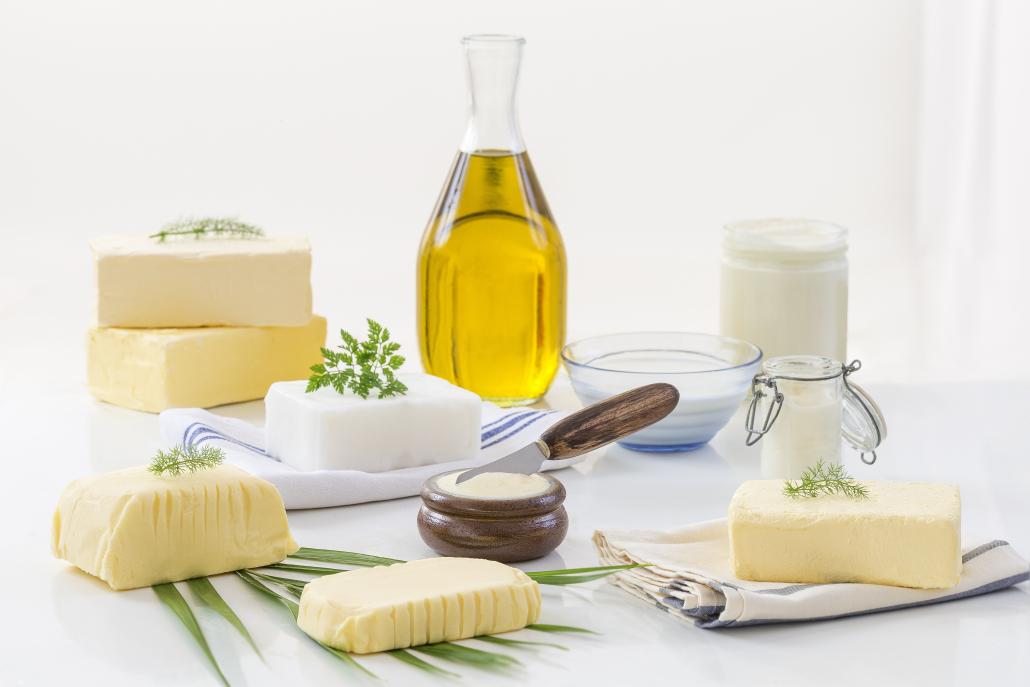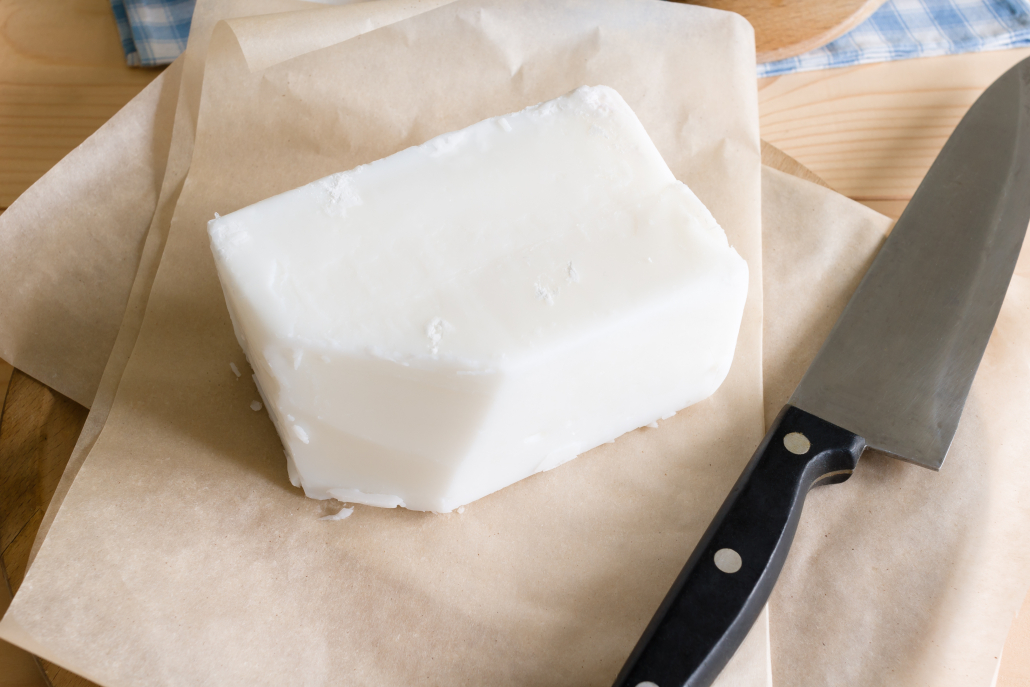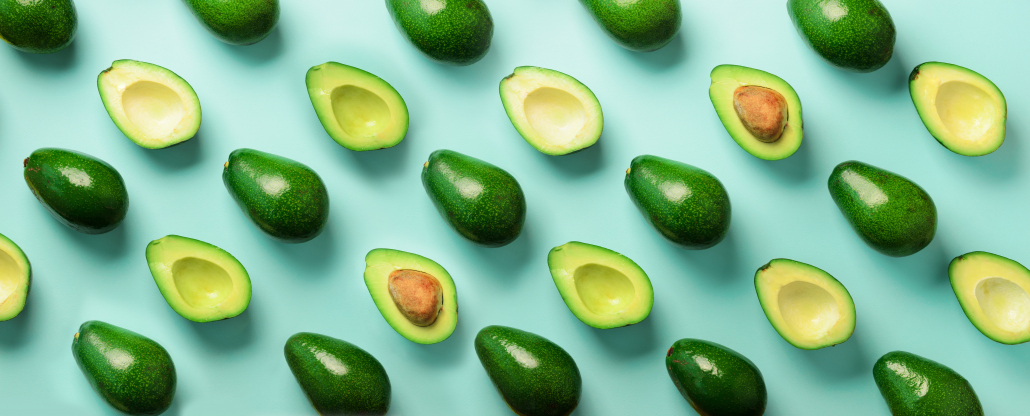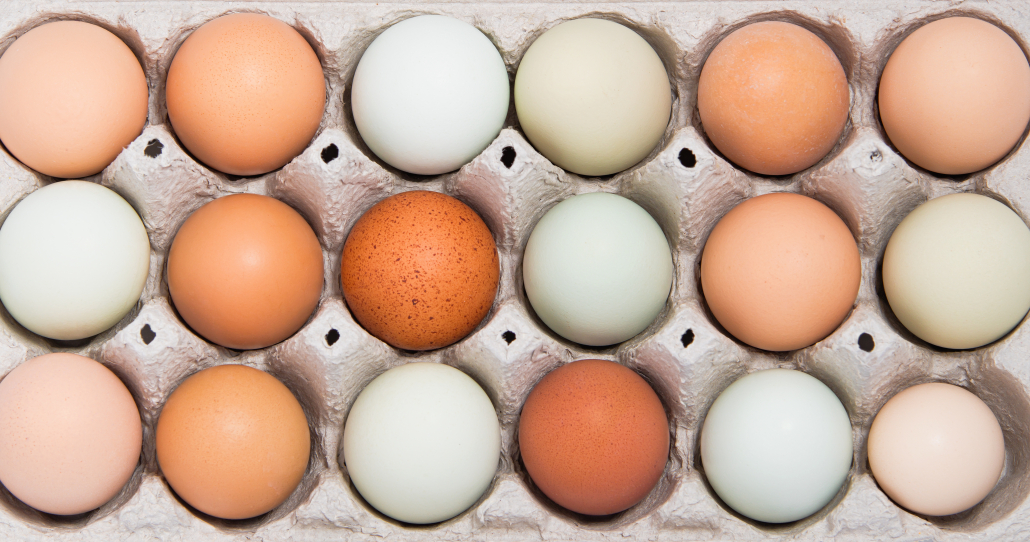We include products in articles we think are useful for our readers. If you buy products or services through links on our website, we may earn a small commission.
Top 10 Healthiest Keto Fats (And Others to Avoid)

Table of Contents
Though keto is a low-carb way of eating, the real key to keto is nourishing your body with plenty of healthy keto fats. In fact, a well-formulated keto diet entails getting 70-80% of all your calories from fat.
The problem is, most people are still living in the shadow of the low-fat craze from the 1980’s and 90’s. So a lot of us are newbies when it comes to knowing what types of fat are truly nourishing, and what types of fat to avoid.
In this article, we’ll explore 10 of the healthiest fats you can add to your keto, carnivore, and low-carb diet.
Healthy Keto Fats
10 of the healthiest fats you can eat on a keto diet include:
- Butter
- Ghee
- Tallow
- Lard
- Cheese
- Creme Fraiche
- Full Fat Yogurt
- Coconut Oil*
- Avocado*
- Olive Oil*
In case you didn’t notice the trend here, most of the healthiest keto fats are highly saturated.
For those uninitiated into the world of high-fat eating, choosing saturated fat runs contrary to nearly 70 years of misguided dietary advice.
Yet new research methods and improved (and unbiased) analysis is finally setting the record straight on saturated fat consumption.
A bellwether 2020 paper in the Journal of the American College of Cardiology, concluded that “Whole-fat dairy, unprocessed meat, eggs, and dark chocolate are SFA-rich foods with a complex matrix that are not associated with increased risk of cardiovascular disease. The totality of available evidence does not support further limiting the intake of such foods.”
Not only has saturated fat been cleared of its false accusations, other recent research shows that some saturated fats are truly great for human health.
For instance, stearic acid activates the mitochondria (energy factories) in your cells, stimulating your metabolism and aiding in weight loss.
When it comes to keto fats, the only outlier with regard to saturated fat content on this list is avocado. But the antioxidants in avocado serve to protect its unsaturated fats from oxidation.
***Fats from animal sources are the prime option for keto. Humans evolved on a diet of mostly animal fat for nearly 2 million years, so our physiology is primed to thrive on these fats. Whereas vegetable fats provide fewer vitamins, higher PUFA content, and can contain plant toxins. These plant-derived fats are best reserved for people practicing a vegetarian or vegan keto diet.
Keto Fat #1: Butter
Butter is a common fat that’s equal parts delicious and nutritious. Containing only trace amounts of carbs, it’s also super keto friendly.
Butter Nutrition
Like ghee, butter is rich in a wide variety of fat-soluble nutrients and healthy fats. The highlights include:
- Vitamins A, D, E, K2
- Selenium
- Iodine
- CLA
| Macronutrient | Per tablespoon | Per 100 grams |
| Calories | 102 calories | 717 calories |
| Carbohydrates | 0 grams | 0 grams |
| Total Fat | 11.5 grams | 81.1 grams |
| Saturated | 7.3 grams (63%) | 51.4 grams |
| Monounsaturated | 3 grams (26%) | 21.0 grams |
| Polyunsaturated | 0.4 grams (3.4%) | 3.0 grams |
| Omega 3 | 0.0 grams (0%) | 0.3 gram |
| Omega 6 | 0.3 grams (2.6%) | 2.2 grams |
| Protein | 0 grams | 0 grams |
Health Benefits of Butter
Butter really shines when it comes to its fat content. Nutritional analysis shows that it contains up to 400 different fatty acids, including both conjugated linoleic acid (CLA) and gut-health-boosting butyric acid.
Adding to the gut-health benefits of butter is it’s lauric acid content. This saturated fat offers antimicrobial and antifungal properties. Studies show that lauric acid reduces pathogenic bacteria in the gut, promoting a robustly healthy intestinal environment.
Butter is also a great source of butyric acid. This important fatty acid fuels the cells of your GI tract. Because butyric acid is so important, and because it can be produced through the fermentation process of dietary fiber in your gut, some nutritionists use this as a reason to promote more fiber intake, despite other adverse effects of fiber.
Butter provides a far easier, more direct, and safer way to provide your body with butyric acid, and protect your body from issues like IBS.
Keto Fat #2: Ghee
Ghee is a unique form of butter made when ‘normal’ butter has been “clarified”. This entails a process where butter is heated and it’s dairy proteins are congealed and removed.
This makes ghee less allergenic, richer and oilier than butter, and gives ghee a higher smoke point when cooking. It’s also arguably more nutritious.
Ghee Nutrition
Ghee is a great source of many fat-soluble nutrients, including vitamin A, vitamin D, vitamin E, Vitamin K2, selenium, iodine, and CLA (conjugated linoleic acid).
| Macronutrient | Per tablespoon | Per 100 grams |
| Calories | 112 calories | 876 calories |
| Carbohydrates | 0 grams | 0 grams |
| Total Fat | 12.7 grams | 100 grams |
| Saturated | 7.9 grams (62%) | 62 grams |
| Monounsaturated | 3.7 grams (29%) | 28.7 grams |
| Polyunsaturated | 0.5 grams (3.7%) | 3.7 grams |
| Omega 3 | 0.2 grams (1.4%) | 1.4 gram |
| Omega 6 | 0.2 grams (1.2%) | 1.2 grams |
| Protein | 0 grams | 0 grams |
| Vitamin A | 3069 IU (61% DV) | |
| Vitamin E | 2.8 mg (14% DV) |
Health Benefits of Ghee
Ghee’s vitamin A content means it may benefit your vision, immunity, and thyroid function. The vitamin A present in ghee is found in a highly bioavailable form.
Though modest, the vitamin D in ghee works synergistically it’s vitamin K2 and calcium to strengthen teeth, joints, and bones.
It can also strengthen your immune system and promote hormonal health.
But since ghee is a fat, its greatest benefits come from its specific fact composition, namely, it’s CLA (Conjugated Linoleic Acid).
Research shows that CLA can lower adiponectin concentrations, which leads to increased insulin sensitivity.
This process regulates blood sugar levels and combats type 2 diabetes, metabolic syndrome, and obesity.2 CLA has been shown to modify testosterone in the body in ways that increase muscle mass and decrease body fat for obese people, while providing an anti-fatigue factor in long distance runners.
Another benefit: ghee is so saturated that frequent consumption can push unhealthy fats out of your cells, producing a healthier metabolic state.
Our final benefit of ghee is a little more practical. Since it’s free of lactose and other milk sugars, ghee doesn’t burn as easily as other cooking oils. Cooking with ghee is an easy way to avoid the ingestion of acrylamide or ALEs (advanced lipoxidation end-products).
Keto Fat #3: Tallow

Tallow is animal fat (normally beef fat) that has been rendered into a more shelf-stable form. Tallow provides a concentrated blend of animal-based nutrients.
Tallow Nutrition
Tallow is rich in fat-soluble vitamins, healthy fats, and other nutrients.
Grass-fed tallow is even more nutritious; it contains higher amounts of vitamin E, CLA (conjugated linoleic acid), and omega 3’s than conventional tallow does.
| Macronutrient | Per tablespoon | Per 100 grams |
| Calories | 115 calories | 902 calories |
| Carbohydrates | 0 grams | 0 grams |
| Total Fat | 13 grams | 100 grams |
| Saturated | 6.4 grams (59%) | 49.8 grams |
| Monounsaturated | 5.4 grams (42%) | 41.8 grams |
| Polyunsaturated | 0.5 grams (4%) | 4 grams |
| Omega 3 | 0.08 grams (0.6%) | 0.6 gram |
| Omega 6 | 0.4 grams (3.1%) | 3.1 grams |
| Protein | 0 grams | 0 grams |
Health Benefits of Tallow
Tallow has been shown to boost metabolism, promote healthier body composition, and increase levels of energy and warmth.
Keto Fat#4: Lard
Lard is pig fat that has been rendered into a more shelf-stable form. Most lard comes from a pig’s back fat, or ‘leaf fat.’
Lard Nutrition
Lard is surprisingly nutritious. Opt for pastured lard if you can — Since the pigs get to bask in the sunshine they produce vitamin D and other important fat-soluble vitamins.
Lard from feedlot pigs, on the other hand, is lower in vitamin D and higher in unhealthy fats. This is because, unlike ruminants, pigs can’t convert unhealthy fats into healthy fats–they are what they eat.
| Macronutrient | Per tablespoon | Per 100 grams |
| Calories | 115 calories | 902 calories |
| Carbohydrates | 0 grams | 0 grams |
| Total Fat | 13 grams | 100 grams |
| Saturated | 5 grams (39%) | 39 grams |
| Monounsaturated | 5.7 grams (45%) | 45.1 grams |
| Polyunsaturated | 1.4 grams (11%) | 11.2 grams |
| Omega 3 | 0.125 grams (1%) | 1 gram |
| Omega 6 | 1.25 grams (11%) | 10.5 grams |
| Protein | 0 grams | 0 grams |
Health Benefits of Lard
Lard provides healthy fats and trace nutrients (particularly if it’s pastured). Its vitamin D content may make it great for immunity, and body composition.
Keto Fat #5: Cheese
There are hundreds of types of cheese — and most of them are keto-friendly, high-fat foods.
Cheese Nutrition (Gouda)
One ounce of gouda cheese provides ~7 grams of complete protein, lots of calcium, and only trace amounts of carbs.
Cheese is very high in saturated fat, leading some sources to recommend restricting it. Far from being unhealthy, the saturated fats in cheese may actually be protective against cardiovascular problems.
| Macronutrient | Per ounce | Per 100 grams |
| Calories | 101 calories | 356 calories |
| Carbohydrates | 0.1 grams | 0 grams |
| Total Fat | 7.8 grams | 27.4 grams |
| Saturated | 5 grams (64%) | 17.6 grams |
| Monounsaturated | 2.2 grams (28%) | 7.7 grams |
| Polyunsaturated | 0.2 grams (2.5%) | 0.7 grams |
| Omega 3 | 0.1 grams (1.2%) | 0.4 gram |
| Omega 6 | 0 grams (0%) | 0 grams |
| Protein | 7.1 grams | 24.9 grams |
Health Benefits of Cheese
The calcium and K2 in cheese provide one of the most holistic ways to ensure your bones stay healthy and strong. To get this benefit choose aged cheeses as they’re highest in K2.
Cheese may also be a natural fertility booster. It’s high in a rare nutrient, spermidine, that has both anti-aging and pro-fertility properties.
Keto Fat #6: Creme Fraiche
Creme fraiche is a thick cultured cream that’s famous for its rich flavor. It’s sometimes used to bring out the sweetness of desserts and other treats.
Think of it as the sophisticated (and fattier) French cousin to good ol’ American sour cream. It’s a delicious way to spruce up your keto scrambled eggs.
Creme Fraiche Nutrition
| Macronutrient | Per tablespoon | Per 100 grams |
| Calories | 49 calories | 340 calories |
| Carbohydrates | 0.4 grams | 2.8 grams |
| Total Fat | 5.2 grams | 36.1 grams |
| Saturated | 3.3 grams (63%) | 23 grams |
| Monounsaturated | 1.3 grams (25%) | 9.1 grams |
| Polyunsaturated | 0.2 grams (3.8%) | 1.6 grams |
| Omega 3 | 0.0 grams (0%) | 0.2 grams |
| Omega 6 | 0.1 grams (1.9%) | 0.9 grams |
| Protein | 0.4 grams | 0 grams |
Creme Fraiche Benefits
Creme fraiche is highly satiating. If you’re struggling to feel full after keto-friendly meals, adding in just a couple of tablespoons of this delicious fat source should do the trick.
Much like ghee, creme fraiche is very high in butterfat, making it stable during cooking and baking — so don’t worry about the formation of any harmful byproducts.
Keto Fat #7: Full Fat Yogurt
Yogurt is a fermented dairy product that’s been known and loved by humankind for thousands of years.
Yogurt is also impressively nutritious. It’s high in protein and fat, low in carbs, and completely keto-friendly (just make sure you get the full-fat, sugar-free variety).
Full Fat Yogurt Nutrition
Like other dairy products, yogurt is rich in healthy saturated fats, calcium, and a variety of fat-soluble vitamins. Yogurt is also a great source of gut-friendly probiotics.
| Macronutrient | Per cup | Per 100 grams |
| Calories | 150 calories | 61 calories |
| Carbohydrates | 11.4 grams | 4.7 grams |
| Total Fat | 8 grams | 3.3 grams |
| Saturated | 5.1 grams (44.7%) | 2.1grams |
| Monounsaturated | 2.2 grams (19%) | 0.9 grams |
| Polyunsaturated | 0.2 grams (1.7%) | 0.1 grams |
| Omega 3 | 0.1 grams (0.8%) | 0.0 grams |
| Omega 6 | 0.0 grams (0%) | 0.0 grams |
| Protein | 8.5 grams | 3.5 grams |
Full Fat Yogurt Benefits
In addition to benefiting your gut health, studies show that yogurt may strengthen your immune system, benefit your heart, and reduce your risk of developing osteoporosis. And don’t skimp on the fat — studies also show that full-fat yogurt is better for weight loss than low-fat varieties.
Keto Fat #8 Coconut Oil

Coconut oil has burst onto the dietary scene in recent years, and research has supported its reputation as a true superfood.
But even before its validation by modern science, coconut oil has been a staple for traditional populations for time immemorial.
Back in 1981 researchers studied Tokelau islanders who got more than 60% of their calories from coconuts. They found that the islanders were in great health with very few incidences of heart disease.
Another study looking at the health of coconut eating Kitavan people of Papua New Guinea found that they had almost no incidences of stroke or heart disease.
The secret to the health benefits of coconut oil may be its abundance of a type of saturated fat called medium-chain triglycerides (MCTs). MCTs make up 54% of the fat in coconut oil.
MCTs are especially supportive of a keto diet because they tend to be transported directly to the liver where they are metabolized into ketones.
Coconut Oil Nutrition
| Macronutrient | Per tablespoon | Per 100 grams |
| Calories | 112 calories | 892 calories |
| Carbohydrates | 0 grams | 0 grams |
| Total Fat | 13.5 grams | 99 grams |
| Saturated | 11.2 grams | 82.4 grams |
| Monounsaturated | 0.8 grams | 6 grams |
| Polyunsaturated | 0.8 grams | 6 grams |
| Omega 3 | — | .04 gram |
| Omega 6 | — | — |
| Protein | 0 grams | 0 grams |
Health Benefits of Coconut Oil
Coconut oil has numerous clinically studied health benefits that all point back to its special fatty acid composition.
The lauric acid that makes up 50% of coconut oil fatty acids forms a compound called monolaurin when digested. Both lauric acid on its own and monolaurin have been shown to destroy harmful pathogens including bacteria, fungi, and viruses.
The MCTs in coconut oil have been shown to boost fat burning.
MCTs have also been found to support the brain function of people with milder forms of Alzheimer’s disease, likely due to their breakdown into ketones.
And when it comes to improving body composition (getting rid of fat), MCTs excel, especially when it comes to reducing stubborn belly fat.
Keto Fat #9: Avocados

In addition to being delicious, avocados deliver a generous dose of vitamins and minerals. They’re a decent source of vitamin E and C.
Avocado nutrition
| Macronutrient | Per avocado | Per 100 grams |
| Calories | 227 calories | 167 calories |
| Carbohydrates | 11.8 grams | 8.6 grams |
| Total Fat | 21 grams | 15.4 grams |
| Saturated | 2.9 grams (13.8%) | 2.1 grams |
| Monounsaturated | 13.3 grams (63.3%) | 9.8 grams |
| Polyunsaturated | 2.5 grams (11.9%) | 1.8 grams |
| Omega 3 | 0.2 grams (0.9%) | 0.1 grams |
| Omega 6 | 2.3 grams (10.9%) | 1.7 grams |
| Protein | 0 grams | 0 grams |
Avocado health benefits
Studies show that avocados can support your heart, maintain healthy blood sugar levels, and help you age gracefully.
Avocados also have a practical benefit: they’re a great addition to many keto dishes. If you’ve never tried guacamole with parmesan cheese crisps, you’re missing out!
Keto Fat #10: Olive oil
Olive oil is a time-tested cooking oil that’s also completely keto-friendly. Plus it’s super easy to incorporate into dishes.
Olive Oil Nutrition
While olive oil isn’t quite as saturated as the other cooking fats on our list (it’s only 14% saturated), it more than makes up for it in other areas.
The primary fatty acid in olive oil is oleic acid, a monounsaturated fat with some impressive health benefits. Studies show that oleic acid can reduce inflammation and decrease the chances of some types of cancer.
| Macronutrient | Per tablespoon | Per 100 grams |
| Calories | 119 calories | 884 calories |
| Carbohydrates | 0 grams | 0 grams |
| Total Fat | 13.5 grams | 100 grams |
| Saturated | 1.9 grams (14%) | 14 grams |
| Monounsaturated | 9.8 grams (72.5%) | 72.5 grams |
| Polyunsaturated | 1.4 grams (10.3%) | 10.3 grams |
| Omega 3 | 0.1 grams (0.7%) | 0.7 grams |
| Omega 6 | 1.3 grams (9.6%) | 9.6 grams |
| Protein | 0 grams | 0 grams |
Olive Oil Health Benefits
Olive oil is rich in a broad spectrum of health-promoting antioxidants, including vitamin E.
The antioxidants in olive oil may reduce your chance of degenerative diseases. They may also help the cholesterol in your bloodstream (and brain) resist oxidation — keeping your body ‘fresher’ on the molecular level.
Perhaps the most interesting benefit of olive oil is that it’s one of the few food sources of mead acid. This unusual omega-9 fatty acid is normally only found in the tissues of young humans and animals. Studies show that mead acid has several potential health benefits, including anti-cancer qualities.
Keto Fat Bonus: Eggs

Eggs contain everything needed to form a new animal — and almost everything needed to nourish a human.
They also provide a perfect fat to protein ratio for the keto diet.
The top nutrients in eggs include healthy fats, complete proteins, and an impressive blend of water-soluble and fat-soluble vitamins.
Egg nutrition
Eggs contain a nearly perfect blend of omega 3s, 6s, and 9s. Pasture-raised, free-range eggs have an especially great omega 3:6 ratio.
Eggs are a rich source of B vitamins, including folate and choline. Just one egg contains around 140 milligrams of choline — 25% of your recommended daily value. (Most of this choline is found in the yolk, so don’t just eat the white).
| Macronutrient | 1 egg | Per 100 grams |
| Calories | 70 calories | 140 calories |
| Carbohydrates | 0 grams | 0 grams |
| Total Fat | 6 grams | 12 grams |
| Saturated | 1.5 grams (25%) | 3 grams |
| Monounsaturated | 2 grams (33%) | 4 grams |
| Polyunsaturated | 1 gram (16.6%) | 2 grams |
| Omega 3 | 0.2 grams (3.3%) | 0.4 gram |
| Omega 6 | 0.8 grams (13.3%) | 1.6 grams |
| Protein | 5 grams | 10 grams |
Health Benefits of Eggs
Eggs are a fertility superfood for both genders. For men, eggs contain powerful antioxidants that can protect sperm from oxidative degradation.
For women, the choline in eggs directly combats one of the most common pregnancy-related nutrient deficiencies.
Eggs also contain steroid hormones that provide systemic anti-catabolic (reduce breakdown of muscle mass) effects — so much so that old-school bodybuilders and other athletes advocated for consuming dozens of eggs a day. Don’t neglect eggs if you want to build muscle or increase your fitness level.
Fats to Avoid on Keto
While nuts and seeds are technically keto friendly, there are a few reasons to consider limiting or eliminating them on a keto diet.
Three major reasons for eliminating seeds and nuts include:
- PUFAs (Polyunsaturated Fatty Acids)
- The presence of plant toxins and antinutrients
- Constipation
PUFAs
Nuts and seeds contain large amounts of polyunsaturated Omega-6 fats. PUFAs are easily oxidized and inflammatory. Nuts and seeds further contribute to the imbalanced fat intake most people on a Standard American Diet are already facing.
Studies show that Omega-6 linoleic acid (not to be confused with Conjugated Linoleic Acid) in body tissue and blood cells is positively associated with heart disease.
Researchers believe that the oxidation of LDL cholesterol that can lead to heart disease is initiated by the oxidation of Omega-6 PUFAs contained within the LDL particles.
Plant Toxins
Nuts and seeds also contain large amounts of plant toxins and antinutrients — especially if they’re not properly prepared by soaking and heating.
Antinutrients bind to nutrients, reducing nutrient uptake, while at the same time inhibiting digestive enzymes.
While nuts and seeds may appear to have high vitamin/mineral levels on paper, their antinutrient content means these substances aren’t properly absorbed. And their presence can inhibit the absorption of nutrients from other foods.
Constipation
Last, but not least, high consumption of nuts and seeds can lead to constipation. The insoluble fiber they contain can cause or exacerbate digestive issues.
Seed and Vegetable Oils to Avoid
Seed and vegetable oils are highly processed industrial foods.
Numerous studies link them trans fats in porcessed vegetable oils to inflammation and heart disease.
Trans fats are found in:
- Margarine
- Vegetable Shortening
- Ingredients that list Hydrogenated (fully or partially) Oils
The second kind of fats to avoid or reduce are called polyunsaturated fatty acids (PUFAs).
Oils that don’t have trans fats, but that are high in PUFAs can still increase inflammation and cardiovascular disease.
These industrial oils are cheap, which means they’re everywhere. Most take-out is loaded with vegetbale oils. And even high-end restaurants use them. Common varieties with their PUFA content include:
- Grapeseed oil: 70.6% PUFA
- Sunflower oil: 68% PUFA
- Flax oil: 66% PUFA
- Safflower oil: 65% PUFA
- Corn oil: 54.6% PUFA
- Walnut oil: 53.9% PUFA
- Cottonseed oil: 52.4% PUFA
- Vegetable oil (soybean oil): 51.4% PUFA
- Sesame oil: 42% PUFA
- Peanut oil: 33.4% PUFA
If your keto goals include reduce processed foods and eating in alignment with our ancestral deitary evolution, we strongly recommend getting your fat from whole foods like tallow, lard, full-fat dairy, and eggs.
Keto Fats: The takeaway
Fat is the fuel that makes keto work — and keto-friendly fats provide a delicious, nutritious way to increase your fat intake on the keto diet.
Some of the best keto fats include tallow, lard, ghee, butter, eggs, cheese, creme fraiche, full-fat yogurt, avocado, and olive oil. If you want to turn your body into a fat-burning machine, enjoy these ultra-nourishing foods.
And consider combining them with other keto superfoods like fatty cuts of meat, salmon roe, and bone marrow.





















